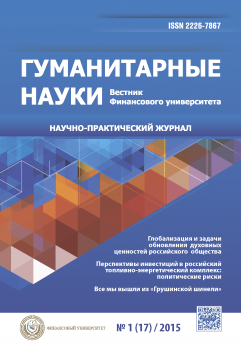The article analyzes the main trends in cultural policy of Russia in the post-Soviet period, it is noted that the understanding of the strategic importance of culture for the preservation of national security is able to consolidate society in the context of globalization. It is noted that the State is responsible for the formation of a common cultural space required for the formation of national identity. As basic documents are considered “Basics of state cultural policy” and “Strategy of the state cultural policy for the period up to 2030”, in which the cultures of priority is recognized for the first time at the state level as an essential part of personal, social and political development, the state acts as an active organizer of sociocultural society. The result of the state cultural policy can be considered conceptual design strategy in the field of culture, the definition of specific goals and objectives, developing specific mechanisms for the implementation of this project.
post-Soviet period, the state cultural policy, the consolidation of society, national unity, national identity
Системные трансформации мирового геополитического пространства в постсоветский период актуализируют значение культуры, которая в современном мире может стать как фактором нестабильности, так и основой гармонизации и консолидации общества. Нет сомнений, что именно культура лежит в основе национальной идентичности и социального взаимодействия в обществе. Обычно сферу культуры связывают с прошлым, а экономику – с будущим, однако в ХХI в. именно культура определяет цели и задачи, становясь базой для коллективных устремлений и надежд. Поэтому современной России необходима государственно-ориентированная культурная политика, учитывающая все национальные и конфессиональные особенности и создающая основу консолидации страны на политико-культурном уровне.
О формировании национальной и культурной идентичности писали многие философы (Ж.-Ж. Руссо, Г. Гегель, И. Фихте, Н.Я. Данилевский, В. Соловьев, Н. Бердяев), и сейчас ни у кого не вызывает сомнений тот факт, что государство в этом процессе играет ключевую роль. Чувство национального единства формируется посредством создания единого культурного пространства (языка, традиций, осмысления общей истории и судьбы). Следовательно, развитие и стабильность того или иного государства напрямую зависит от того, насколько государство готово взять на себя функции построения коллективной национальной идентичности, и главным инструментом в этом выступает именно культурная политика.
1. Shatilov A.B. Innovatsionnyy proekt modernizatsii Rossii i pozitsiya vlastnoy elity [The innovative project of Russia’s modernization and the position of the ruling elite]. Vlast’ Publ., 2013, I. 9.
2. Tseli i prioritety kul’turnoy politiki sovremennoy Rossii: mneniya ekspertov i pozitsiya naseleniya. Analiticheskaya zapiska po itogam ekspertnogo oprosa v ramkakh obshcherossiyskogo sotsiologicheskogo issledovaniya [The objectives and priorities of the cultural policy of modern Russia: the views of experts and the public position. Analytical note on the results of the expert survey in the framework of national sociological research]. Moscow, 2013.
3. Shatilov A.B. GR: chto eto takoe i pochemu v nem voznikaet potrebnost’ u biznesa? [What is it and why it arises the need to have a business?]. Gumanitarnye nauki. Vestnik Finansovogo universiteta [Humanitarian sciences. Journal of Finance University]. 2011, I. 1, pp. 49 - 54.
4. The foundations of the state cultural policy // URL: http//static.kremlin.ru/media/events/files/41d526a87768a8730eb.pdf
5. The strategy of the state cultural policy for the period till 2030 // URL: http://mkrf.ru/upload/mkrf/mkdocs2016/09_03_2016_01.pdf





